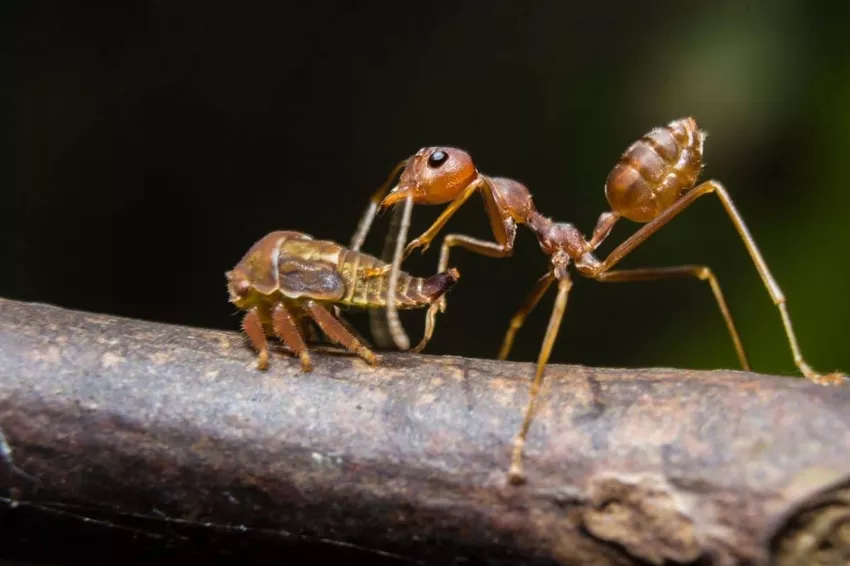- Do ants eat aphids?
- Ants and lice live in symbiosis
- nutrition of the lice
- Ants love honeydew
- How ants milk lice
- The quid pro quo of the ants
- frequently asked Questions

Wherever aphids (Aphidoidea) appear, ants soon swarm. Have they discovered tasty food in the lice, or is their relationship characterized by mutual benefit? Animal way of life to amaze.
In a nutshell
- Ants and aphids are often found together
- they are not predators
- they live in a very rewarding symbiosis
- Lice excrete a dew that ants love and collect
- Ants, for their part, protect lice from predators
Do ants eat aphids?
The answer is an unequivocal no. Ants (Formicidae) are not predators of aphids. Ants are also not on the menu of aphids. The two species of insects also do not compete for the infested plant. Anyone who observes ants and aphids for a little while will see this confirmed with their own eyes. But the attentive observer also realizes that the spatial proximity cannot be mere coincidence.
Ants and lice live in symbiosis
Ants and aphids team up regularly because it allows them to benefit each other. Such a linked way of life, from which both species benefit, is called symbiosis in science. The intriguing question here is: What attracts ants and what is the reward for the aphids?

Tip: Ants are useful insects that eat all kinds of pests in the garden. But for the sake of a symbiosis with aphids, you shouldn't just sit idly by and watch your plants. It is well known that aphids can severely damage plants or even cause them to die.
nutrition of the lice
In order to understand the close relationship between the two types of insects, it is necessary to take a look at the digestion process of lice. These are the crucial key data:
- Lice suck a lot of plant sap
- they mainly release proteins from it
- Sugar and water remain
- they are eliminated
- the secretion is called honeydew
Ants love honeydew
Ants love the dew from lice because it contains valuable carbohydrates and amino acids. Since they cannot produce the sugary solution themselves, they look out for colonies of aphids in the garden. If you spot an aphid infestation, start harvesting honey immediately. Then, in addition to countless lice, there are also larger numbers of ants on the infested plant and in the surrounding area.

Notice: Ants don't just love the sticky dew from aphids. They also seem to like the dew from scale insects and some types of cicadas, which is why a symbiotic relationship is also established here.
How ants milk lice
The continuously and automatically excreted dew usually drips onto the leaves of the plant. It dries quickly and forms a sticky film. This sticky mass is not easily and effortlessly sucked up by ants. Valuable nutrients remain unused for them.
However, the ants have found a way of getting the honeydew in a state of absolute freshness. They just milk the lice. Here, milking means nothing other than that lice are specifically encouraged by ants to excrete the sugar solution immediately and in their presence. Where they got their technology from remains their mystery. In practice, milking always follows the same pattern: Ants drum on the rear part of an aphid with their antennae, which causes it to excrete its honeydew. The ants then suck it up immediately after it has been excreted, even before it has a chance to dry up.

Tip: If you see a lot of ants running up and down a plant stem, look out for lice. It may be necessary to hurry to protect the plant from the sap suckers.
The quid pro quo of the ants
The aphids let themselves be lured out of the honey without resistance, because they, too, benefit from the presence of the ants, or because they provide the “quid pro quo” in a targeted manner. They protect aphids from predators by immediately attacking and driving away any predator that appears near the aphids. Predators can be, for example:
- various insects, especially ladybugs
- be crazy
- birds
The less the lice suffer from natural enemies thanks to ants, the more the population grows. For ants, this fact means even more honeydew. A win-win situation!
frequently asked Questions
Why do lice excrete a relatively large amount of sticky dew?Proteins only occur in small amounts in plant sap. In order to meet their high protein requirements, aphids have to suck and digest a lot of plant sap. Accordingly, the sweet "waste product" also accumulates in large quantities.
Do all species of ants collect honeydew?Honeydew is not of equal interest to all ant species. It is mainly brown road ants and black road ants that enter into a symbiotic relationship with lice and practice the technique of milking.
Do I have to fight both types of insects at the same time on an infested plant?No, it is sufficient if you only take action against aphids. These are the real pests. Once the lice are gone, there is no reason for the ants to stay on the plant any longer. They pull away all by themselves.